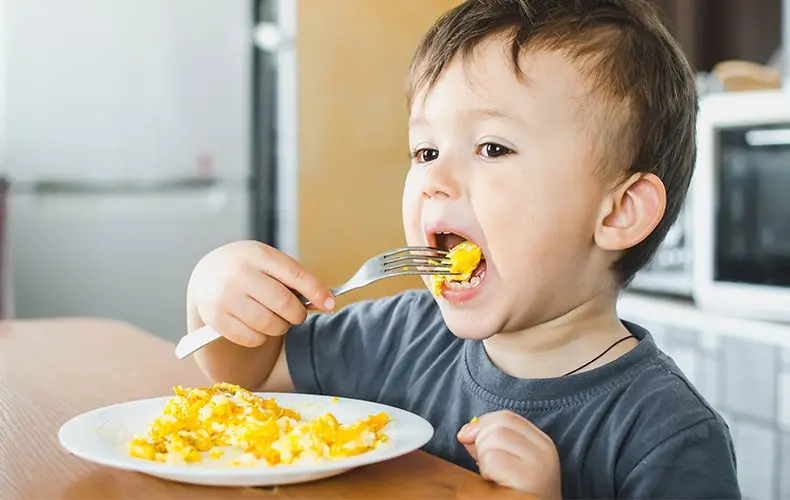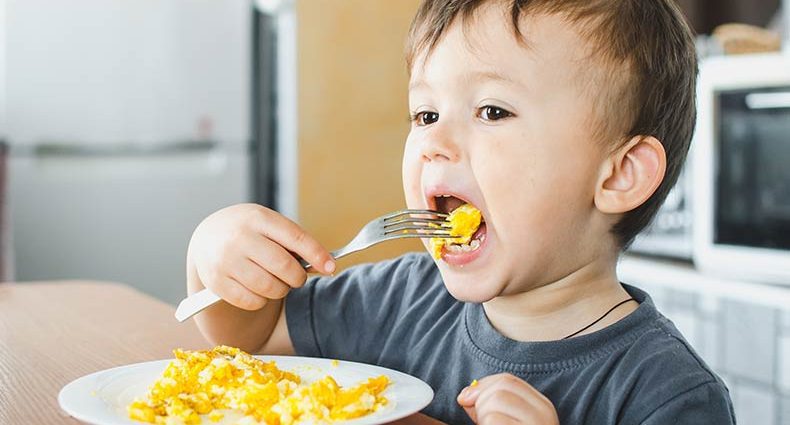Contents
What do adults usually eat for breakfast? Omelet, scrambled eggs, porridge, muesli, casseroles, cheesecakes, sandwiches… There are more than enough options. And if a baby gets acquainted with grain products already at the age of 4 to 6 months, then the question of when and how to acquaint a baby with an egg is a burning one for mothers of grown-up babies.
The yolk contains lecithin, necessary for the normal functioning of the nervous system, metabolism, as well as a large amount of nutrients. Egg whites also provide many benefits. When can you give your child these foods?

How to give a baby yolk for the first time
The first acquaintance of the baby with the egg begins with the yolk. Pediatricians are advised to introduce him to the baby already at the age of 7 months. If the child has a predisposition to allergies, then the introduction of this product into the diet should be discussed with a specialist.
Start feeding with an egg with ¼ pcs. hard-boiled yolk. And be sure to monitor the reaction of the crumbs. By 8 months, it is recommended to increase the amount of the product to ½ pcs.
There are several rules that you should follow if you decide that your baby is ready to try the egg:
- You should start with one crumb of egg yolk in the morning. On this day, do not introduce any new products, monitor the reaction of the child. If you have found a manifestation of an allergy, then it is better not to give chicken eggs until the baby is 1.5 years old.
- If there is no reaction within the next two days, the dose can be increased to 1/4 teaspoon.
During the first year of life, the baby should not eat more than 1/2 of the yolk per day (it does not matter, chicken or quail), after a year – you can give a whole yolk.
- An egg is a rather fatty product, you should not give it to your baby more than 2-3 times a week.
You need to thoroughly wash the egg, and then boil it for at least 15 minutes. Then, for the first injection, you need to give the child 1/6-1/4 of the yolk, gradually increasing its amount daily, but not more than 3 per week. If the child responds normally to the introduction of the egg (there are no allergic reactions), then you can safely add the egg later to the preparation of combined dishes.
After a year, you can make a light omelet for your child: Whisk 1 egg and some milk. Grease a jar of baby food with butter, pour the resulting mass into it and send it to a double boiler.
How to give your baby protein for the first time
Egg protein is almost completely absorbed by the body, but it can be allergenic. Therefore, when including it in the diet of a child, you should additionally consult with a specialist.
Feeding restrictions
You should not introduce an egg or any other food product into the baby’s diet if the baby is unwell, teething or preventive vaccinations are planned.
There is no significant difference between chicken and quail eggs in terms of nutritional value.

How to cook an egg for a baby
Eggs should be offered only in hard-boiled form, and for older children also in the form of a steam omelette, in which various vegetables can also be added. You can cook together, for example, beat an omelet with a whisk and have fun.
What eggs should not be given to children
Babies should not be given waterfowl eggs. In addition, it is strictly forbidden to give undercooked eggs. Soft-boiled and bagged eggs can be hazardous to health. Therefore, it is necessary to make sure that the egg is cooked, and the omelette is well steamed.
According to world recommendations, you can start introducing the yolk from 8 months of the child, you can wait up to a year. initially, the yolk should be introduced into the child’s diet, observing all the rules for the introduction of complementary foods. It is advisable not to introduce other products when introducing the yolk, so that, in the event of an allergy, it would be possible to determine what exactly it manifested itself in.
BENEFITS OF QUAIL EGGS
- Unlike chicken eggs, quail eggs do not cause allergies. On the contrary, the ovomucoid protein present in them is able to suppress allergic reactions. So, if your baby is allergic to chicken protein, you can try giving him a quail egg, carefully observing the baby after taking the product.
- The risk of salmonellosis when eating quail eggs is minimal. For a child, you can boil them soft-boiled, which is very useful. By the way, quail eggs cook much faster than chicken eggs.
- Also in quail eggs there are a lot of vitamins: B1, B2, A, PP, useful amino acids, phosphorus, iron and potassium.
There are no priorities if the correct processing of eggs, proper cooking at temperature conditions are observed. There is a myth that quail eggs do not “tolerate” salmonellosis, so it is better to introduce them. In fact, if you give preference to chicken or quail eggs in order to avoid salmonellosis, then they are on an equal footing. When introducing eggs into the diet, the main thing is to rinse well and allow sufficient heat treatment.











no parlo de nadons, pregunti per nens de 12 anys, cuan pudran manjar 2 ous ?.